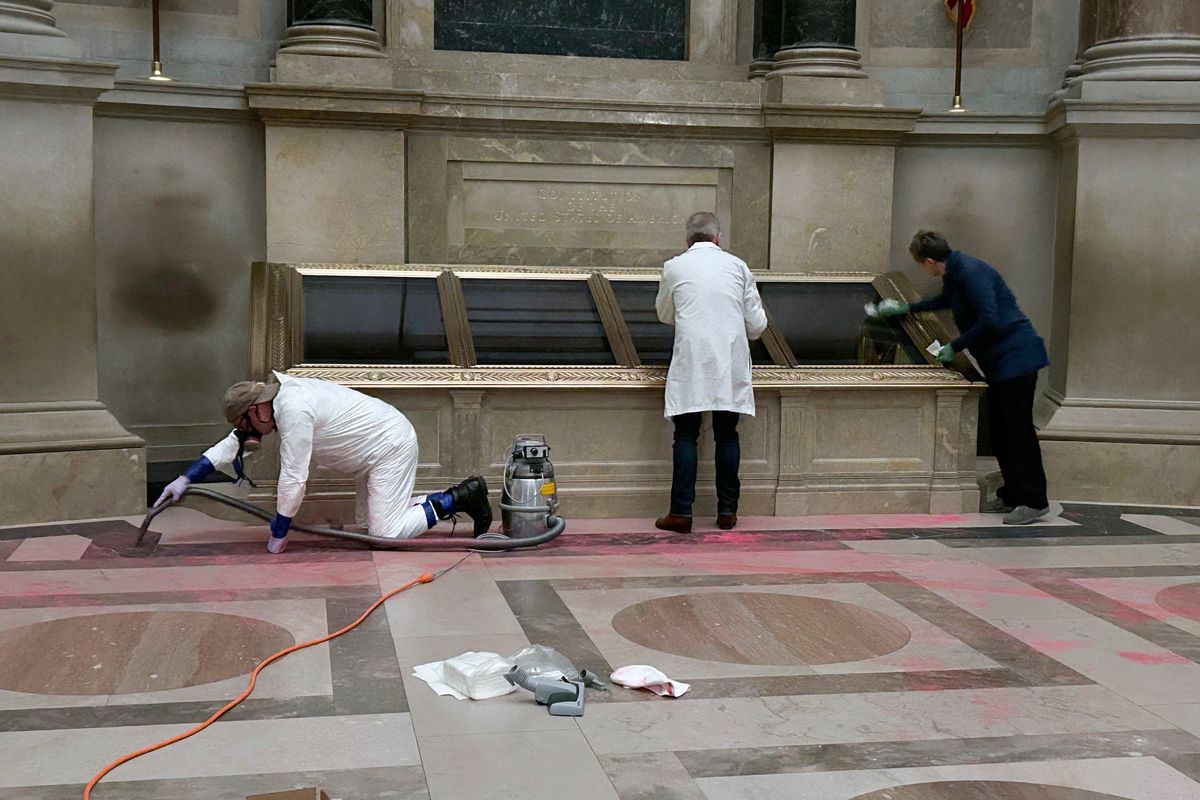Activists sentenced for red powder attacks on U.S. Constitution, museums

Two climate activists have been sentenced to more than a year in prison for throwing red powder on the U.S. Constitution display case at the National Archives after vandalizing art exhibits at Washington museums in earlier protests.
Donald Zepeda, 35, a serial vandal from Maryland, was sentenced to two years in prison for felony destruction of government property after dumping fine red powder over the display case on Feb. 14. Jackson Green, 27, of Utah, was sentenced earlier this week to 18 months for joining in the same offense, which caused more than $50,000 in damage and closed the Archives Rotunda to tourists for four days.
In a statement to the court, Archivist of the United States Colleen Shogan urged U.S. District Judge Amy Berman Jackson to consider a maximum sentence to send “a strong message” of deterrence against attacks on the “temple of our history” and other cultural heritage sites. She said those sites are increasingly being targeted by “those who want to make a political statement without engaging in the hard work it takes to effect social change.”
“The National Archives Rotunda is the sanctuary for our nation’s founding documents. They are here for all Americans to view and understand the principles of our nation,” Shogan said. Attacking such national treasures is “not the same as vandalizing a public park or the wall of an office building – physically or symbolically.”
Prosecutors described the offense as a stunt intended to draw attention to climate change, and called Zepeda “a leader and organizer” of a two-year “campaign of damage” against the capital area.
Jackson called Zepeda’s case one of misdirected action that had no impact on addressing climate change. No one who learned of his action “sat down at dinner and discussed healing the ozone layer” or closing coal plants, the judge said.
“You just gave one more reason to those who resist science to think, ‘This is a bunch of crackpots,’ ” Jackson said. “Ecovandalism is not a good idea. It is just plain old vandalism.”
Zepeda planned and assisted in at least three attacks against public museums in Washington, after earlier breaking into an oil pipeline facility in Florida and throwing chocolate syrup on the steps of that state’s capitol, Assistant U.S. Attorney Cameron A. Tepfer said.
“He caused fear. He caused harm, and he caused $50,000 in damage,” Tepfer said, seeking a four-year sentence because, he argued, Zepeda has not been deterred by prior periods of incarceration nor expressed remorse.
The Archives Rotunda houses the Constitution and the Declaration of Independence, original copies of which have sold for up to $43 million at recent auction.
The Archives is spending an additional $100,000 a year on security, after 50 workers spent days carefully removing powder from between lawyers of glass and cast bronze as it threatened to stain or disfigure the marble cases.
Zepeda since at least 2022 has been a leader and member of a group called Declare Emergency, which has sought to raise awareness of climate change through a series of escalating offenses, prosecutors said.
In April 2023, Zepeda and others blocked morning rush-hour traffic at the intersection of New York Avenue NW and I-395 and again on the George Washington Memorial Parkway, according to a U.S. sentencing memo. The same week, Zepeda and others smeared red and black paint on the case protecting Edgar Degas’s “Little Dancer Aged Fourteen” sculpture in the National Gallery of Art, recording and releasing video of the events, prosecutors said.
That November, Zepeda recorded Green at the same museum, where Green wrote “Honor Them” in red paint near a mural of the 54th Massachusetts Regiment. Afterward, he was ordered by a court to stay away from Washington and its museums and public monuments, and was subsequently detained pending trial by Jackson for violating that order after his February arrest.
Zepeda’s defense asked Jackson for a sentence of a year in prison, counting the nearly nine months he has served under postarrest home confinement. Attorney Stephen F. Brennwald said that “as viscerally infuriating” as Zepeda’s conduct might have been, he never intended to damage the Constitution nor its case, nor anticipated the cost of cleaning it.
“His goal was not to hurt the Constitution, and he didn’t. His goal was to try to get the Biden administration to declare a climate emergency so that vastly greater resources could be committed to the crisis,” Brennwald said. Zepeda has never served more than a 60-day sentence.
Zepeda said his goal was to evoke the same kind of emotion to fight a climate emergency affecting hundreds of millions of people around the world as the revulsion prompted by his actions, likening his cause to movements ending racial apartheid in South Africa and expanding the vote to women in the United States.
Zepeda did not express remorse, but he said would no longer engage in activity that would result in prison. “I’ve done more than enough.”
Green at his sentencing apologized to all affected by his actions, saying he failed to consider the price others would have to pay for them and overestimating the positive impact. “I have come to realize that in addition to causing direct harm to individuals, destructive protest actions like the ones I carried out can lead to the opposite of our intentions by creating a negative response – turning people off from climate activism and creating further discord,” he wrote the court.
Climate activists in 2022 and 2023 mounted a wave of protests targeting cultural sites and events such as the Wimbledon and U.S. Open tennis tournaments. They threw soup on the glass covering the “Mona Lisa” at the Louvre Museum in Paris and on Vincent van Gogh’s “Sunflowers” at the National Gallery in London. Claude Monet’s “Les Meules (Haystacks)” at the Museum Barberini in Potsdam, Germany, was targeted with mashed potatoes.